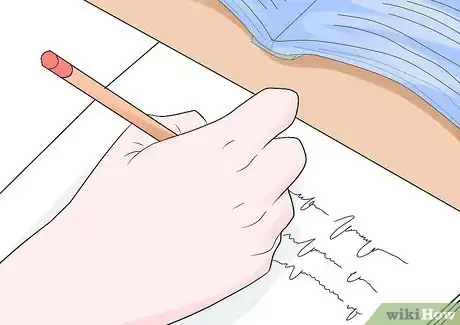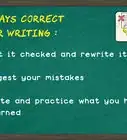This article was co-authored by Language Academia. Language Academia is a private, online language school founded by Kordilia Foxstone. Kordilia and her team specialize in teaching foreign languages and accent reduction. Language Academia offers courses in several languages, including English, Spanish, and Mandarin.
wikiHow marks an article as reader-approved once it receives enough positive feedback. In this case, 83% of readers who voted found the article helpful, earning it our reader-approved status.
This article has been viewed 216,132 times.
Are you having trouble in reading, writing, listening or speaking? You can improve any and all of these skills through practice and repetition.
Steps
Listening
-
1Listen to the instructor and listen well. While you're listening, write down good notes and important details he/she says. Block distracting things from your mind. Listen to other people speaking the same language to improve your speaking and writing and pronunciation.[3]
-
2Speak in front of a class. Take a topic and explain it and be sure to talk loud and clear so people can interpret what you are saying. Discuss the topic of your speech with others as well. There will always be ways in which you can improve. Communicate with different people. Everyone has a different way of speaking and therefore talking with different people can not only help develop your language skills but your social skills as well.[4]
Speaking
-
1Select the details from the text read in Part 1 and have written down in Part 2.
-
2Explain the details out loud. Make reference to the text to support your inferences, points of view and opinions.
-
3Explore the language features and their effects. When speaking, use figurative language to clarify your points, for example, similes, personification, metaphor, etc. Use short sentences to make the points clearer and more pronounced to the audience/reader.[5]
-
4Identify and explain the author's purpose. Discuss this with others if possible.
- Analyze the author's range of vocabulary. How does the author convey messages, moods, attitudes and feelings?
-
5Finish up by commenting on the overall impact of what you have read and written about. In other words, a conclusion, which finishes off your speech/writing.
Community Q&A
-
QuestionHow can I improve my language skills?
 Community AnswerRead books or watch TV shows in that language! Speak the language as much as you can at home or with friends.
Community AnswerRead books or watch TV shows in that language! Speak the language as much as you can at home or with friends. -
QuestionWhen was this article published, and who wrote it?
 DonaganTop AnswererThis article was written anonymously in 2008 ,and partially edited several times since.
DonaganTop AnswererThis article was written anonymously in 2008 ,and partially edited several times since. -
QuestionHow do I improve my English speaking?
 Community AnswerThe key is to practice and be confident. If your city has a lot of foreigners, try talking to them. You can also join classes, and remember to not feel shy, they are humans too. Another way is to practice talking to yourself in front of the mirror - it's not weird at all.
Community AnswerThe key is to practice and be confident. If your city has a lot of foreigners, try talking to them. You can also join classes, and remember to not feel shy, they are humans too. Another way is to practice talking to yourself in front of the mirror - it's not weird at all.
References
- ↑ https://www.uopeople.edu/blog/why-its-important-to-read/
- ↑ https://slc.berkeley.edu/writing-worksheets-and-other-writing-resources/nine-basic-ways-improve-your-style-academic-writing
- ↑ https://learningcenter.unc.edu/tips-and-tools/effective-note-taking-in-class/
- ↑ https://www.uopeople.edu/blog/why-is-public-speaking-important/
- ↑ https://learningcenter.unc.edu/tips-and-tools/learning-a-second-language/
About This Article
The easiest way to improve your language skills is by making a habit of reading, writing, and speaking every day! Set a goal of reading for a half hour every day, and practice your writing at the same time by taking notes on the passage, then writing a short paragraph summarizing what you read. You can also practice your speaking skills by reading the passage aloud, or by talking to your friends about what you’ve been reading recently. For some tips on how to sound confident and natural when speaking in front of any kind of audience, scroll down!






































































